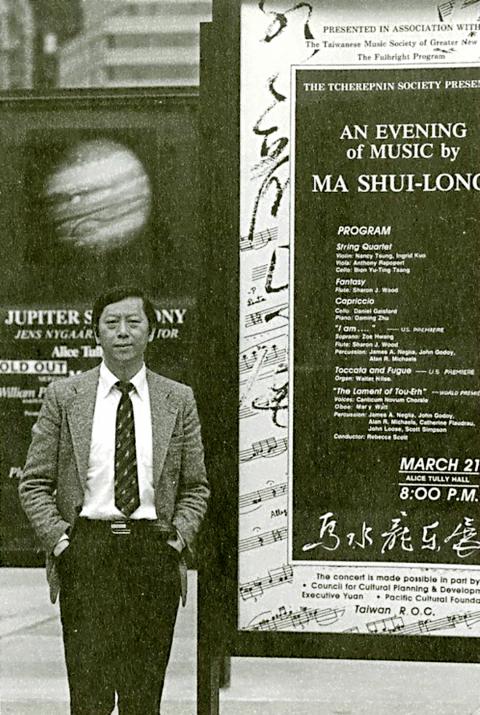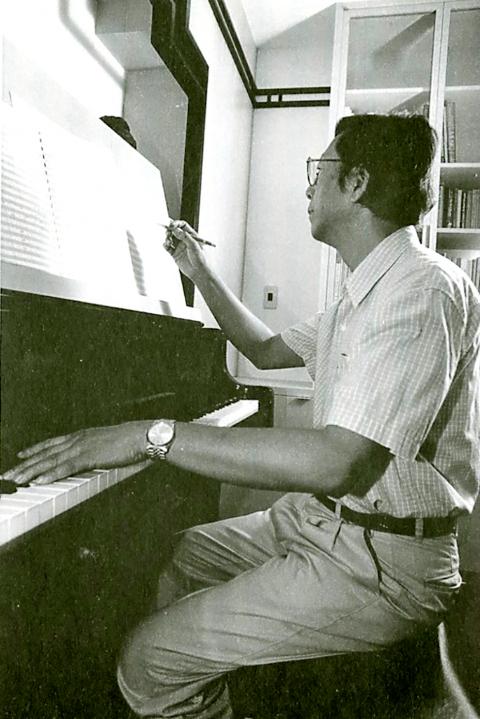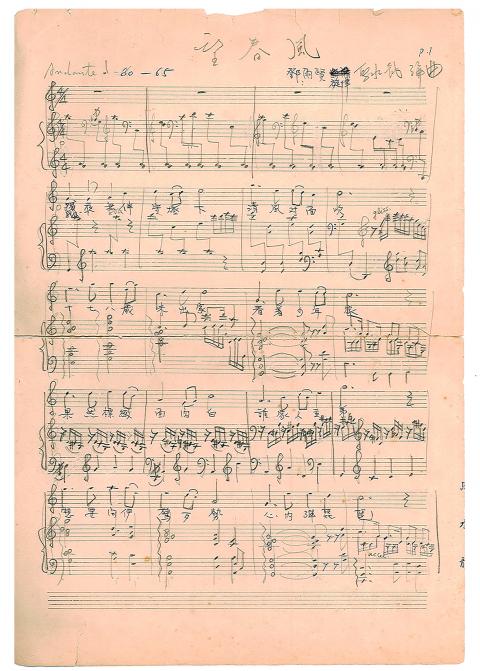July 16 to July 22
The news was mostly overshadowed by the 22nd Golden Bell Awards, but on March 21, 1987 Ma Shui-long (馬水龍) became the first Taiwanese composer to have his work performed at New York’s Lincoln Center for the Performing Arts.
Some sources — including his biography, Musical Maverick: Ma Shui-long (音樂獨行俠馬水龍) — maintain that he was the first composer from the Far East to have a solo show at the prestigious performance hall. However, the honor only received a brief mention in the Central Daily News (中央日報) entertainment section under the title, “Composer Ma Shui-long debuts new material today in the US.”

Photo courtesy of Taiwan Music Institute
Born on July 17, 1939, Ma was just 47 years old.
FUSING EAST AND WEST
Despite the newspaper headline, it appears that just one of the six songs in the program was new — an adaptation of a Yuan Dynasty play, The Injustice of Dou E (竇娥冤), which featured only vocals, suona horn (嗩吶) and a variety of percussion instruments. The study, When Tradition Becomes Modern (當傳統成為現代), notes that while the song is deeply rooted in Eastern traditions, Ma took many liberties to modernize it.

Photo courtesy of Taiwan Music Institute
“The chorus provides a rich layering that’s often missing in traditional Chinese music. The composer’s decision not to use lyrics may have been for the convenience of the performers and for those in the audience who didn’t understand Chinese. But not only has it erased language barriers, it also removes the barrier between voice and instrumentation,” the study states. “Perhaps the combination of suona and chorus can serve as an example of the fusion of East and West.”
Ma’s unique approach earned him praise from notable New York Times music critic Bernard Holland two days later.
Holland writes that Ma “balanced the largely conventional use of Western instruments with the pure intervallic skips and pentatonic melody from his own culture — and it did so without descending into the usual cloying chinoiseries.”

Photo courtesy of National Central Library
“How does he do it? Partly by letting his instruments speak in a European voice but with an Asian mind.”
In addition to Chinese classics, Ma also rearranged Taiwanese folk songs such as the classics Yearning for Spring (望春風) and Mending the Net (補破網). He also composed his own Taiwan-inspired material such as Thoughts of Kuandu (關渡隨想) as well as the score for Cloud Gate Dance Theatre’s 1979 production Liao Tien-ting (廖添丁), a performance about the legendary anti-Japanese “Robin Hood” of Taiwan. He expanded the latter into an orchestral suite in 1988.
As a music professor, Ma strongly believed that cultural preservation and protecting traditions was an “inescapable responsibility,” according to a brief biography by the National Central Library. He would frequently warn his students that while learning Western instruments, theory and techniques, they should not forget their origins, insisting that each student learn at least one traditional instrument.
“He was not anti-Western, but he did not want to see music, or even culture in general completely lean toward the West. He also was a proponent of ‘world music,’ which he thought could loosen Western music’s dominance,” the report stated.
ROAD TO NEW YORK
Ma grew up in the coastal towns of Keelung and Jiufen, and in the 2008 essay, My Musical Journey of Composition (我的創作心路歷程), he notes that his biggest influences remain the classical beiguan, nanguan and Taiwanese Opera he was exposed to in his youth.
Like many Keelung boys, Ma enrolled in a vocational high school that would prepare him for a maritime career. However, fate changed when his father became ill, causing him to drop out and find work as draftsman at a fertilizer factory. One of Ma’s coworkers was future musicologist Lee Che-yang (李哲洋), who encouraged him to pursue his passion in art and music.
After his father’s recovery, Ma enrolled in the composition department at National Taiwan University of the Arts and began his musical journey. After teaching for several years, he received a full scholarship to study at the Regensburg Music Academy in Germany.
“During this period, all I learned was Western musical theory and methods for Western composition. Although these lessons provided me the requisite knowledge and skills for composition, they hardly fulfilled my expectations for expressing musical aesthetics and philosophy,” he writes.
“To be able to compete with Western musicians on the international stage, we must use our own musical language. What else do we have?”
In 1986, Ma earned a Fulbright scholarship to spend a year in the US as a visiting scholar. During a gathering, an American scholar remarked that Easterners are eager to learn about the West. “That is great. But when you’re getting to know about us, why don’t you let us know about you?”
These words lit a fire in Ma’s heart, and he was determined to have his work performed in the US. Not just any venue — he had his sights set on the Lincoln Center. Although people told him it was just a pipe dream, he managed to make it happen with the help of The Tcherepnin Society, a non-profit dedicated to promoting music.
That night, the concert hall was packed — not just with local music aficionados but also a large contingent of Taiwanese Americans who came to show their support. The concert’s success led to three more shows in Washington DC, San Francisco and Los Angeles, by far exceeding his original goal.
Taiwan in Time, a column about Taiwan’s history that is published every Sunday, spotlights important or interesting events around the nation that have anniversaries this week.

On April 26, The Lancet published a letter from two doctors at Taichung-based China Medical University Hospital (CMUH) warning that “Taiwan’s Health Care System is on the Brink of Collapse.” The authors said that “Years of policy inaction and mismanagement of resources have led to the National Health Insurance system operating under unsustainable conditions.” The pushback was immediate. Errors in the paper were quickly identified and publicized, to discredit the authors (the hospital apologized). CNA reported that CMUH said the letter described Taiwan in 2021 as having 62 nurses per 10,000 people, when the correct number was 78 nurses per 10,000

As we live longer, our risk of cognitive impairment is increasing. How can we delay the onset of symptoms? Do we have to give up every indulgence or can small changes make a difference? We asked neurologists for tips on how to keep our brains healthy for life. TAKE CARE OF YOUR HEALTH “All of the sensible things that apply to bodily health apply to brain health,” says Suzanne O’Sullivan, a consultant in neurology at the National Hospital for Neurology and Neurosurgery in London, and the author of The Age of Diagnosis. “When you’re 20, you can get away with absolute

May 5 to May 11 What started out as friction between Taiwanese students at Taichung First High School and a Japanese head cook escalated dramatically over the first two weeks of May 1927. It began on April 30 when the cook’s wife knew that lotus starch used in that night’s dinner had rat feces in it, but failed to inform staff until the meal was already prepared. The students believed that her silence was intentional, and filed a complaint. The school’s Japanese administrators sided with the cook’s family, dismissing the students as troublemakers and clamping down on their freedoms — with

As Donald Trump’s executive order in March led to the shuttering of Voice of America (VOA) — the global broadcaster whose roots date back to the fight against Nazi propaganda — he quickly attracted support from figures not used to aligning themselves with any US administration. Trump had ordered the US Agency for Global Media, the federal agency that funds VOA and other groups promoting independent journalism overseas, to be “eliminated to the maximum extent consistent with applicable law.” The decision suddenly halted programming in 49 languages to more than 425 million people. In Moscow, Margarita Simonyan, the hardline editor-in-chief of the